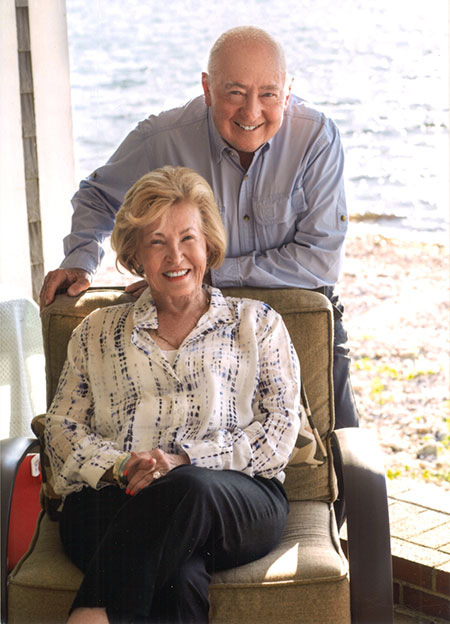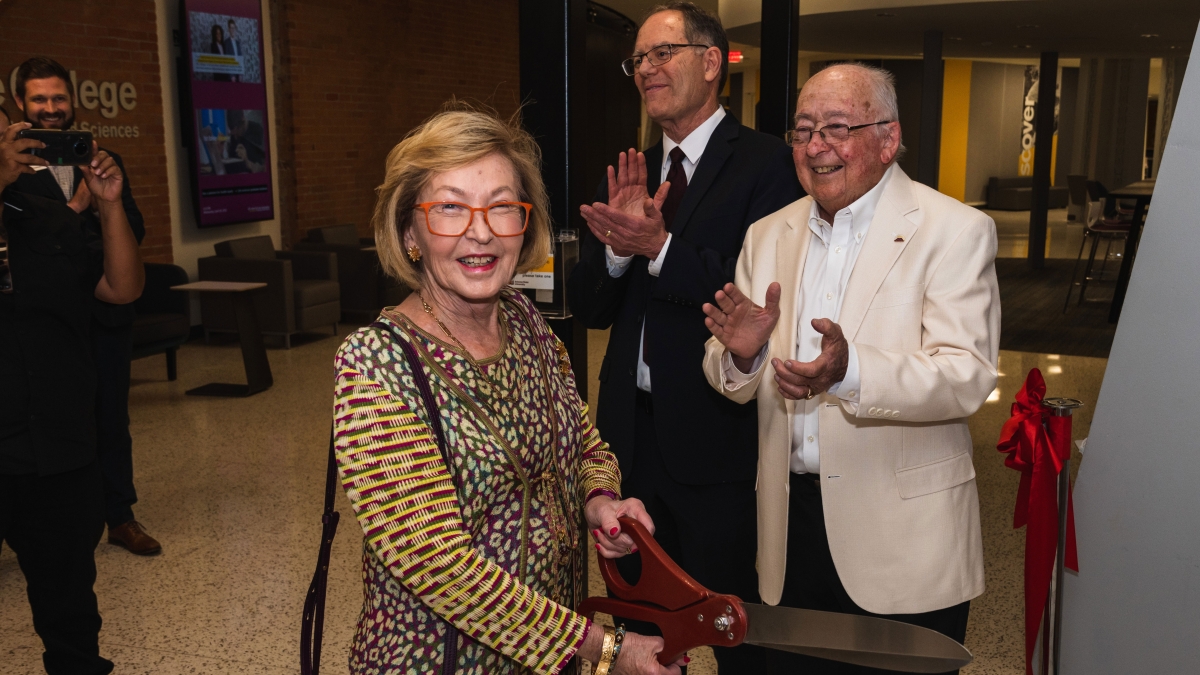Since 1997, husband and wife Herb and Laura Roskind have been a part of the Arizona State University community in myriad ways, having a profound impact on students within The College of Liberal Arts and Sciences and across the university. In recognition of their ongoing commitment to student success, The College dedicated the Great Hall in Armstrong Hall on the Tempe campus in their name on Wednesday evening.
“I really see the Roskind Great Hall being the focal point, the nexus, for all students,” said Laura Roskind. “As they spend their four years as an undergraduate or a graduate student, at some point they do pass through that hall, and I'm hoping that will have great meaning for students, whatever they do in the future, and to sustain a sense of curiosity and learning all through their lives.”
The Roskinds’ long relationship with ASU began when they moved from Massachusetts to Arizona after Herb retired. As they were looking for a way to get involved in their community, the couple decided to take several courses.
From there, they connected with faculty members, and Herb was asked to lend his expertise in global commodity trading to a textbook. This grew into Herb teaching Global Trade in Real Time — a course that emphasizes the role of cultural differences in global trade negotiations — in the School of Politics and Global Studies (SPGS). Herb has now taught the course as a faculty associate for over a decade, but his impact extends far beyond the classroom.
“More than what he teaches students in the classroom — what’s made a tremendous impact to our SPGS students is Herb’s mentorship, which doesn’t end when his course ends,” said Magda Hinojosa, director of the School of Politics and Global Studies. “Ten, 12 years later, he’s still keeping in touch with his former students and providing advice.”
In addition to Herb’s involvement as a faculty member, the Roskinds have been actively involved with a number of university initiatives. They serve on The College Dean’s Council, the Institute of Human Origins' (IHO) research council and executive board, the ASU President's Club and the Cornerstone Society, and are involved with the School of Earth and Space Exploration, the Center for the Study of Religion and Conflict and the Walter Cronkite School of Journalism and Mass Communication.
For over five years, Laura served as an ASU trustee and will soon rejoin as a trustee this August. She also initiated the implementation of several other dean and directors boards across the university, of which she also serves as a member, including for the ASU Art Museum, the School of Politics and Global Studies, the School for the Future of Innovation in Society, and the Herberger Institute for Design and the Arts Dean's Creativity Council.

Laura and Herb Roskind have been involved at ASU in myriad ways, from investing in student success programs to both taking and teaching courses. Photo courtesy the Roskinds
“Herb and Laura’s philanthropy and dedication to IHO, including their service as executive board and various committee members, has been really significant to the success of IHO’s faculty research, graduate student training and general operations of the institute,” said Yohannes Haile-Selassie, director of the Institute of Human Origins. “I believe they will do everything possible to make sure that IHO remains the global leader in human origins research. This is their vision, and their vision is IHO’s vision as well.”
The couple has invested in several programs within The College, including the Early Start program, a free, two-week immersion program for first-year students that helps them prepare for the transition to ASU.
Their most recent gift will help to expand the efforts of The College’s Futures Center, with the development of new paid internships and mentorship opportunities for students across The College. In addition, the gift will help to strengthen programming to support students as they prepare to graduate and go into the workforce.
“This gift by Herb and Laura Roskind is allowing us to provide financial support to many students who need financial assistance to make those internships work,” said Patrick Kenney, dean of The College of Liberal Arts and Sciences. “The pathway from the beginning to the end of college is a complete avenue for which The College is working all the time — getting them started well, getting them finished well — we’re happy to name the Great Hall after them.”
Moving forward, the Roskinds are eager to find new ways to offer support to The College and continue advancing access and opportunities for all students.
Top photo: Laura Roskind cuts the ceremonial ribbon at the dedication of the Roskind Great Hall in Armstrong Hall on the Tempe campus on Wednesday evening. Her husband, Herb (right), and Patrick Kenney, dean of The College of Liberal Arts and Sciences, clap behind her. Photo by Max Conacher/The College
More University news

ASU community exceeds goal, raises $835K for Valley of the Sun United Way
The Arizona State University community stepped up and raised over $835,266 for the Valley of the Sun United Way — exceeding the $800,000 goal for 2024.Of the total, $802,192.17 was raised through…

ASU launches online ocean futures undergraduate degrees
Our oceans make up three quarters of the planet’s surface and contain most of its biodiversity. Due to rapid and global changes, they are endangered — making more urgent a deeper knowledge of ocean…

ASU public affairs graduate programs rise to No. 11 in nation in US News & World Report’s 2025 rankings
Arizona State University rose to No. 11 nationwide for best graduate public affairs programs in U.S. News & World Report’s 2025 rankings, the magazine announced.The ranking, released April 8,…


